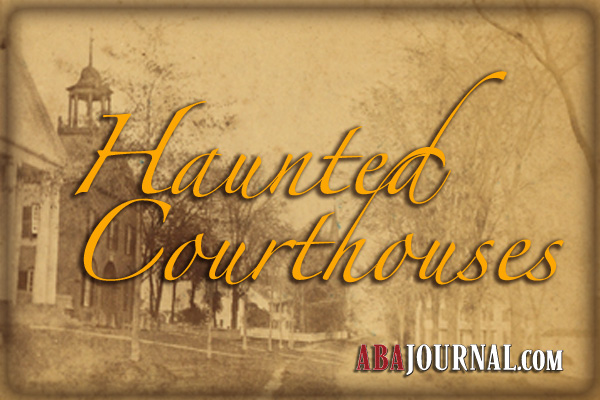Can real estate disclosure laws protect buyers from the supernatural?

Illustration by Sara Wadford/ABA Journal.
Real estate agent Nancy Blaker Weber is no stranger to old ghost stories swirling around a grand Victorian house nestled on the banks of the Hudson River in Nyack, New York. Decades ago, the family living in it reported levitations, apparitions and other strange happenings. But that didn’t stop Blaker Weber from selling the home for a third time in June.
“I’ve spent a lot of time in the house and have never experienced anything odd,” Blaker Weber says. “That being said, I always thought it was a good idea to disclose the history.”
The issue of supernatural real estate disclosure was tested in court when the home’s history was immortalized in a 1991 court decision known as the “Ghostbusters ruling.” In 1989, the Ackley family was poised to sell the house to buyer Jeffrey Stambovsky but failed to mention a couple of things: First, they had seen three friendly ghosts, including a young woman in a hooded cape, a naval officer in American Revolutionary War garb and an elderly levitating man; and second, they had told the local press and a national magazine all about it.
Stambovsky, however, was in no mood to disappear into thin air like those apparitions. He filed a lawsuit against the Ackleys after discovering they were less than forthcoming about the ghosts, and he had already handed over a down payment. The result was a groundbreaking state supreme court ruling that has been taught in law schools. The court found that the Ackley house was legally haunted.
New York is not the only state addressing legal issues around real estate and the paranormal—there are at least three others. Real estate disclosure laws may offer buyers some protection if they unwittingly make an offer on a place with a history of apparitions or crime scene investigations. But that depends on where you live.
What if a house is ‘haunted?’
In real estate circles, properties with a dubious history or reputation are “stigmatized.” The National Association of Realtors defines such properties as “psychologically impacted by an event which occurred, or was suspected to have occurred, on the property, such event being one that has no physical impact of any kind.”
At least 37 states and the District of Columbia have laws addressing stigmatized properties, according to the NAR, which compiled a list of state laws in May 2020. But the organization’s associate counsel Deanne M. Rymarowicz says laws on stigmatized properties can vary widely from state to state, although most of them require disclosure of material defects.
“Even a death on the property may not be material under a state’s law. In Nevada for example, it’s material only if there was a defect in the house that caused the death,” Rymarowicz says.
New Jersey, Minnesota and Massachusetts specifically address the paranormal during disclosure, according to Zillow’s state-by-state analysis in 2019. In New Jersey, a seller must reveal strange goings-on, but only if asked about it. In Minnesota and Massachusetts, the supernatural is mentioned in laws on the books, but it does not need to be disclosed.
In New York, the Stambovsky v. Ackley ruling means courts can rescind a sale if, according to Zillow, a seller “creates or perpetuates” stories about the paranormal activity but then fails to tell a buyer about it. In the 3-2 decision, the appellate division of the New York Supreme Court refused to award Stambovsky damages but allowed him to void the contract.
“As a matter of law, the house is haunted,” Justice Israel Rubin wrote in the majority opinion.
But that hasn’t deterred three celebrities—including filmmaker and actor Adam Brooks; singer-songwriter Ingrid Michaelson; and reggae singer and rapper Matisyahu—from calling the property home, according to Blaker Weber, who last sold the five-bedroom home for its listing price of $1.795 million in June. It seems that none of her clients have traded crucifixes for picture frames or seen anything otherworldly floating down its winding staircases.
In the current topsy-turvy housing market, however, “haunted” properties can produce mixed results. Randall Bell, an expert appraiser of stigmatized property, says discounts for purportedly haunted homes “are very real.”
On the other hand, a home’s notoriety can be one of its biggest selling points. That was the case for the Lizzie Borden House in Fall River, Massachusetts, a bed-and-breakfast and the site of the 1892 ax murders of Borden’s father and stepmother, which sold this year for $1.875 million after it was listed for $2 million. Also, the Rhode Island home that inspired the 2013 film The Conjuring recently went on the market for $1.2 million. It is currently under contract for an undisclosed amount.
“Anything to do with the paranormal is very big right now,” contends Massachusetts real estate agent Suzanne St. John, even though she sold the Borden property for less than its asking price. She also consulted with the agents selling The Conjuring house.
At the Lizzie Borden House, St. John, who also works at there as a tour guide, says she has felt her hair stand up on end several times. Now, the real estate agent is trying to sell the Maplecroft Mansion, where Borden lived out her life after she was acquitted of the brutal murders and where St. John says she has also run into a ghost. The house is priced at $890,000 and has been on the market for more than a year. Still, St. John says, the home’s origins have yet to prompt buyers to haggle for a discount.
When it comes to the supernatural, not everyone is lucky enough to know what might be in store for them.
Last year, Danielle Witt and Ben Rockey-Harris bought a quaint bungalow in Cottage City, Maryland, but later learned a boy’s exorcism that took place in the home had inspired novelist William Peter Blatty’s 1971 book, The Exorcist, which William Friedkin adapted into the demonic movie of same name.
Maryland does not address the paranormal in its real estate laws. And DeWitt told Washingtonian magazine that several potential buyers had backed away from the home before they bought it. She told NPR’s Weekend Edition she and Rockey-Harris got the property for less than its asking price.
Perception, perception, perception
“The typical real estate professional will say, ‘Location, location, location,’” says Bell. “And I would say it’s more a matter of perception.”
Bell says disclosure laws about the paranormal are never really about the existence of ghosts, but rather how people look at properties and their worth.
An expert on real estate damages, Bell has appraised some of America’s most notorious properties and appeared as an expert witness in state and federal court cases. He has appraised the San Diego County, California, mansion where 39 Heaven’s Gate followers killed themselves; the Los Angeles townhome where Nicole Brown Simpson and waiter Ron Goldman were stabbed to death; and the Colorado home where 6-year-old JonBenét Ramsey was killed.
Bell estimates that if a property is the site of a murder or suicide, a seller is looking at a 10% to 25% loss in value. He would like to see disclosure laws on stigmatized properties across all 50 states. California, where the appraiser is based, has recognized the impact of stigma on resale value. The state requires a seller to disclose a death on a property within the previous three years.
However, he believes Pennsylvania is lagging. In 2014, the state’s supreme court ruled that a murder-suicide was not something a seller had to disclose because it was not a material defect. According to the court,”purely psychological stigmas are not important defects of property that sellers must disclose to buyers.”
Bell believes that some states have been slow to pass laws because the subject of stigmatized properties is an uncomfortable one for lawmakers.
“It’s one thing to have a crack in your pool; that’s measurable,” Bell says. “But when you go into something more intangible, they’re just reluctant to get into it.”




